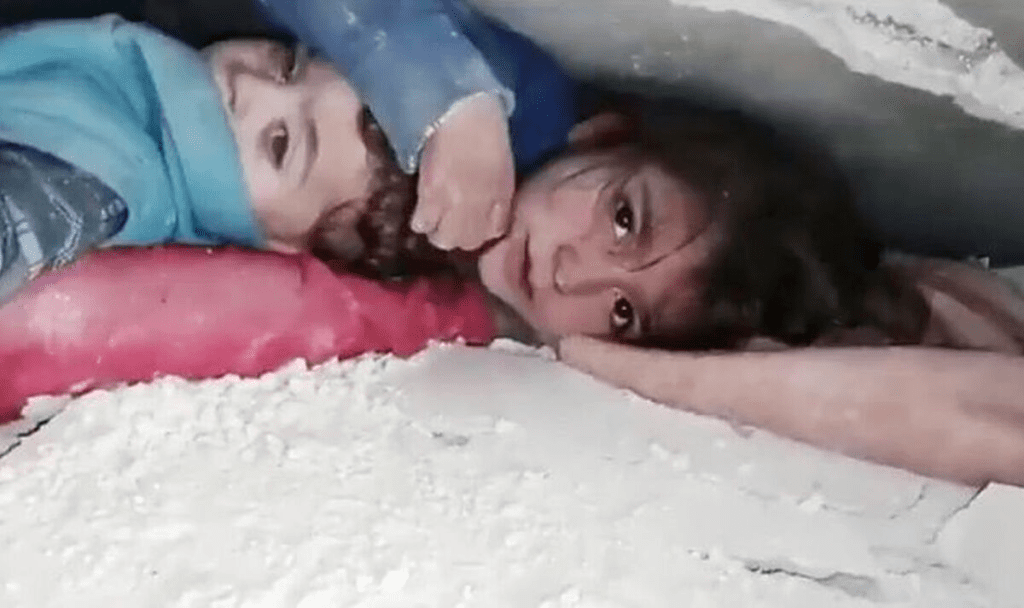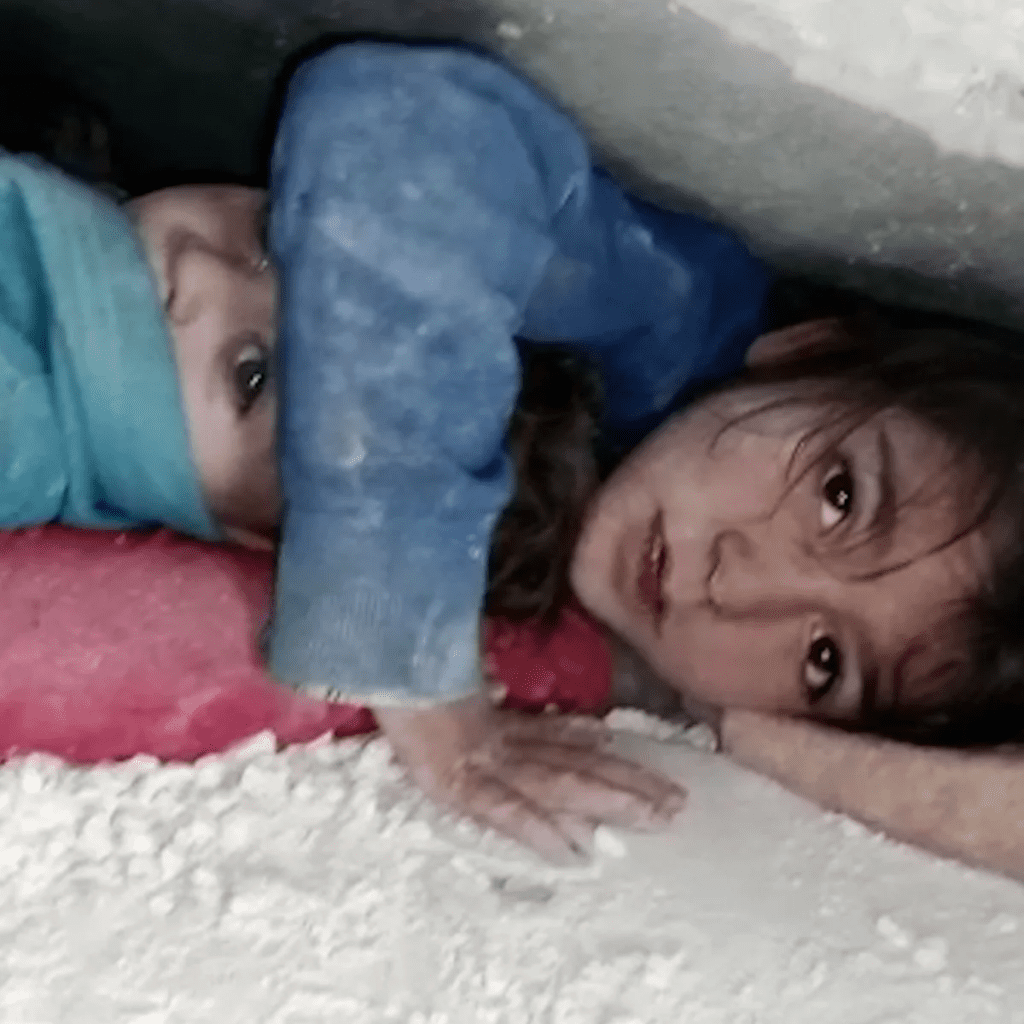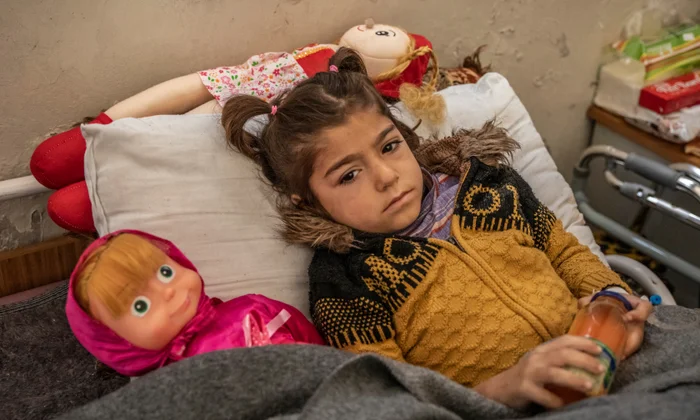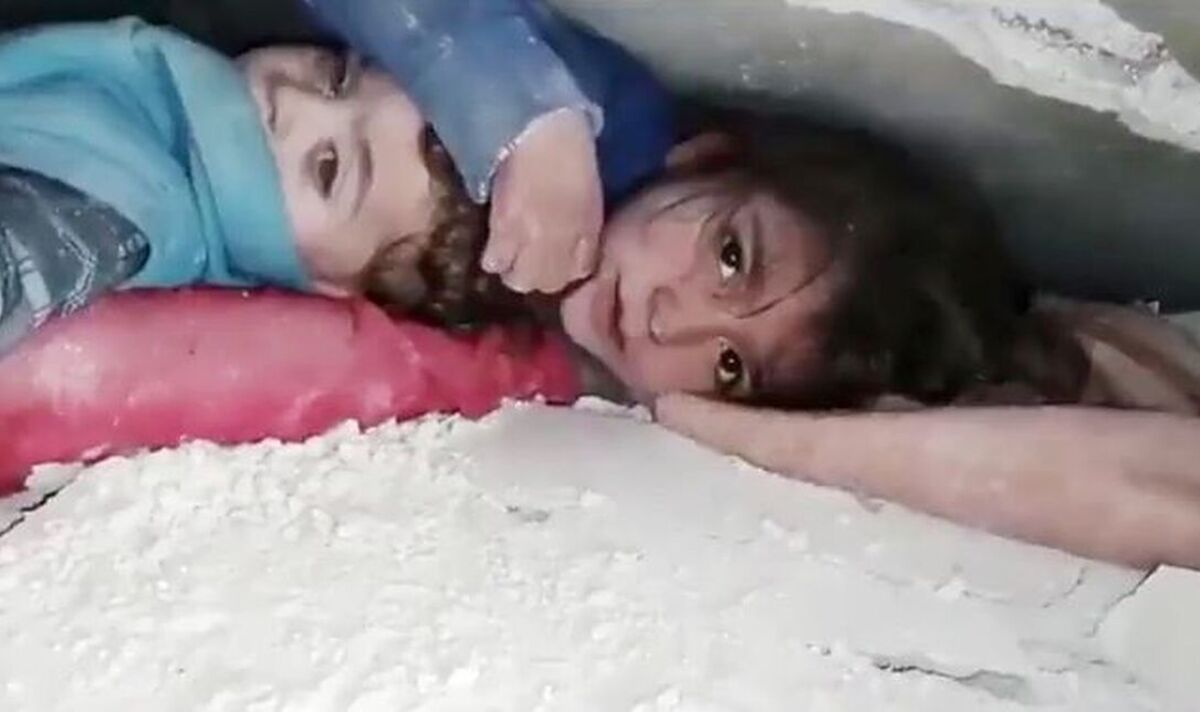A Whisper Beneath the Rubble
It was in the shattered silence after Syria’s catastrophic earthquake that Omar Rahal heard a faint voice. The sound was so weak he wondered if it was only in his mind. The night before, two powerful quakes, magnitudes 7.8 and 7.6, had struck the rebel-held province of Idlib, leveling the village of Harem and burying families beneath concrete and dust.
Among the destroyed homes was the apartment of Rahal’s cousin Mahmoud, who lived there with his wife Suaad and their seven children. Desperate to find them alive, Rahal, the local police chief, joined the rescue efforts at dawn. For hours, he heard nothing but the cracking of debris, until, at 12:30 p.m., a small voice broke through the rubble:
“Get me out of here.”

A Miracle in the Debris
Following the sound, Rahal discovered five-year-old Jinan, trapped a few meters beneath the wreckage, her small body pinned between slabs of concrete. Next to her lay her nine-month-old brother Abdullah, miraculously alive, comforted by his sister’s arms. Near them was their mother, Suaad, her outstretched arm frozen in an embrace that had shielded her children from the falling debris.
Unable to free the children alone, Rahal filmed their situation and sent the video to his colleagues. The footage spread rapidly, first among local rescuers, then across the world. Within hours, it had gone viral, watched millions of times and symbolizing both the horror and fragile hope amid Idlib’s tragedy.
“My men arrived immediately and helped me extract little Abdullah, who fortunately had only minor scratches”, Rahal told The Guardian. “But Jinan was different , she was pinned under a concrete slab, and an iron rod had pierced her leg.”

A Race Against Time
In Idlib, rescue efforts were agonizingly slow. The region remained largely sealed off for two days after the quake, with little equipment and no international aid. Locals were forced to dig through ruins with bare hands.
“To lift the concrete block, we used a car jack, the kind for changing a tire”, Rahal said. “It worked, but the rod in Jinan’s leg had to be cut.”
As rescuers tried to slice through the metal with a steel blade, Jinan screamed in pain. Aftershocks rocked the village, causing what was left of nearby buildings to crumble.
“Please! Get me out of here”, she cried.
Time was running out. “We had no choice”, Rahal said. “We risked our lives and hers. In the end, we pulled her out while the rod was still partially inside her leg.”
After nearly 22 hours under the rubble, Jinan was finally freed: crying, injured, but alive.
Survival and Unimaginable Loss
A week later, reporters from The Guardian visited Jinan and Abdullah at a hospital in Idlib, a makeshift medical center converted from a former school. Abdullah slept soundly under a wool blanket, while Jinan lay on a cot, her leg bandaged and swollen.
“Her leg injury is very serious”, said Dr. Wajih al-Karrat, her attending physician. “She may never walk the same again. If it doesn’t improve, we may have to amputate.”
Tragically, Jinan and Abdullah are now the only survivors of their family. Their parents and five siblings were killed in the collapse. They have since been placed in the care of their great-uncle and his wife, who are now their guardians.

Children of the Rubble
Jinan and Abdullah are just two of countless children orphaned by the devastating earthquakes that struck northwestern Syria. The death toll in the country has risen above 3,580, and aid agencies continue to call for access to the rebel-held northwest, where humanitarian support remains limited.
“It’s a tragedy”, Dr. Karrat said quietly. “Jinan knows she has only her brother left. But look around, many of these children still don’t know their parents are gone. They ask when their mothers and fathers will come.”
He paused, glancing at the rows of small patients. “First, we try to heal them. Then one day, we must tell them the truth, that they, too, are orphans.”

A Cry the World Will Not Forget
Jinan’s faint plea – “Get me out of here” – has echoed far beyond the ruins of Harem. Her survival is a testament to courage, compassion, and the unyielding will to live even amid unspeakable loss.
In the ashes of devastation, her story stands as both a symbol of hope and a reminder of the human cost of disaster of families shattered, children orphaned, and the power of one small voice that refused to fade away.
